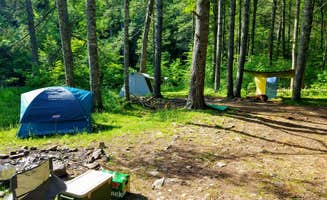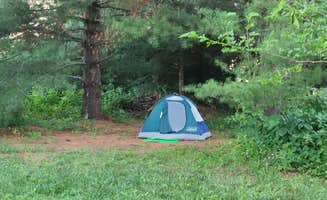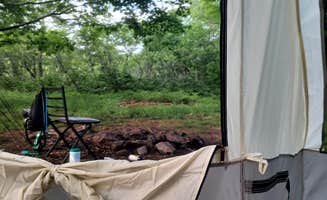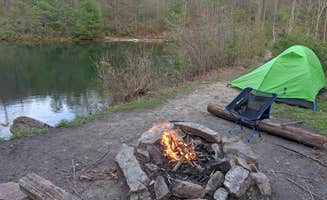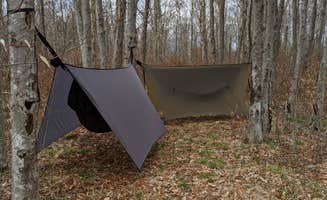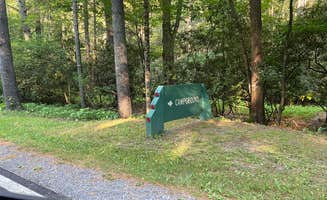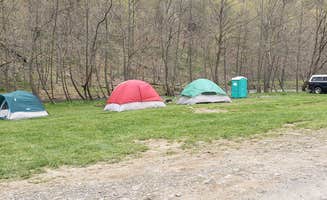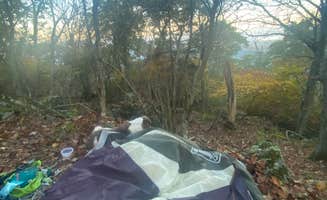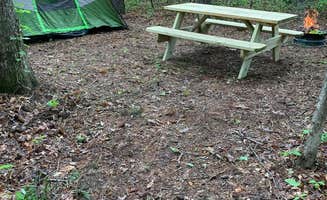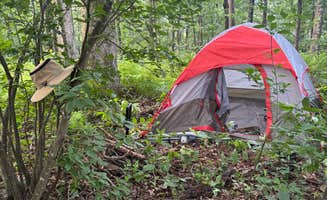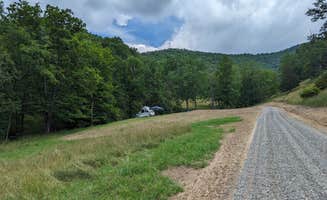Tent camping near Churchville, Virginia offers diverse terrain options from river access to secluded forest settings. The Shenandoah Valley region sits at elevations ranging from 1,200-2,500 feet, creating moderate temperature variations between day and night. Most primitive sites require careful planning as cell service ranges from spotty to nonexistent throughout George Washington National Forest camping areas.
What to do
Fishing opportunities: At Poor Farm Dispersed Recreation Area, campers can access river fishing spots directly from their campsites. "Really enjoyed this place. Maybe 5-10 min off of highway 220. There are maybe 5 ish spots to camp next to a river in this mountain valley," reports one visitor, noting the convenient location for water activities.
Stargazing: The region provides exceptional night sky viewing due to minimal light pollution. At Walnut Grove, one camper noted "The night sky was amazing. You could see stars for miles. Enjoyed a nice sunset by the river." Some state parks even provide telescopes for free at their camp stores.
Mushroom exploration: For those interested in learning about local fungi, Hawk Nest Mushroom Farm offers a unique camping experience with educational opportunities. "We got a nice tour of the mushrooms currently growing at the farm," shares one visitor who appreciated this uncommon camping activity.
What campers like
River proximity: Campers particularly enjoy sites with direct water access. At Canoe Landing Group Campsite, visitors appreciate the river recreation options: "Camp here hike up stream then just sit back and float back to your site all to yourself." The ability to combine hiking and floating creates a convenient loop activity.
Privacy levels: Many tent campers prioritize secluded spots. "The camp area sits under a canopy of cedar trees," notes a Hawk Nest Mushroom Farm visitor, highlighting the peaceful setting. Sites farther from main roads generally provide better isolation from traffic noise and other campers.
Wildlife viewing: The natural setting offers opportunities to observe local animals. Multiple campers mention seeing various wildlife, though proper food storage is essential. "There are bears here, so lock up your food in the car," warns one visitor to Switzer Lake Dispersed Camping, who "encountered a bear at or around the campsite 3 times."
What you should know
Road conditions: Access to the best tent camping near Churchville, Virginia often requires navigating unpaved roads. At Switzer Lake Dispersed Camping, visitors should prepare for challenging driving conditions: "The road is pretty rocky, but nothing crazy. Take it slow and most vehicles can get by." Weather significantly impacts road quality.
Campsite selection strategy: Many dispersed areas have varying site quality. "There is a huge variety of spots, starting from huge ones right on the lake to more secluded, smaller spots deeper in the woods along the creek," notes one Switzer Lake camper. Weekday arrivals typically offer better site selection opportunities.
Water considerations: Most primitive camping locations require bringing your own water. "There's nothing there so plan ahead for water and bathroom use," explains a camper at Switzer Lake. Those camping near water sources should still bring filtration equipment as natural water isn't tested for safety.
Tips for camping with families
Best facilities for children: Families should consider established campgrounds with amenities. At Branch Pond, "Camp sites were large and had enough privacy! Very clean bathrooms and showers!" making it suitable for families needing more conveniences than dispersed camping offers.
Safety precautions: Parents should be aware of specific hazards. Near water, supervision is critical as one Canoe Landing visitor notes about the James River: "would be careful swimming with children. Most areas are very calm but the river can get rapid at times."
Weather preparation: Summer afternoon thunderstorms commonly occur in the region, so waterproof gear is essential. Fall camping requires warm clothing as temperatures drop significantly at night. One camper reported "Average Evening Temp: 30" during an October stay, highlighting the need for proper cold-weather sleeping equipment.
Tips from RVers
Site selection for vehicles: RV campers should thoroughly research access roads before committing to remote sites. "This ain't for rookies!" warns one Switzer Lake visitor about the rough roads, recommending "Make sure your rig is equipped" for off-road conditions.
Seasonal considerations: Late spring through early fall provides the most reliable road conditions for larger vehicles. Winter and early spring can create mud issues that make access difficult even for four-wheel drive vehicles, particularly after rain or snow melt.
Alternative RV options: Many RVers prefer more established campgrounds with proper facilities. "Paved roads with level dirt/gravel wooded sites having W/E (50A)" notes a visitor about one Virginia state park, though specifics on hookups and amenities vary significantly between locations.


